The Olympics are a great opportunity to teach kids about a variety of subjects in a fun and memorable way. Check out these Olympic games activities for students of all ages!
[The following post contains affiliate links. You can read my disclosure here.]
Even as a child, I remember feeling like the Olympics were something special. As I’ve gotten older, I must admit I like watching sports less and less. But still the Olympics draw me.
Maybe it is the pride I feel for our country when the national anthem is played. Perhaps it is the human drama. Or the fact that even though the games are marred at times with drug use and political maneuverings, there is always the hope that the world really can come together and be at peace—at least for a time.
I think that is what we all want our kids to see and experience.
Will your family watch the olympic games? Why not make it a fun, memorable, and educational event?
10 Olympic Learning Activity Ideas for All Ages
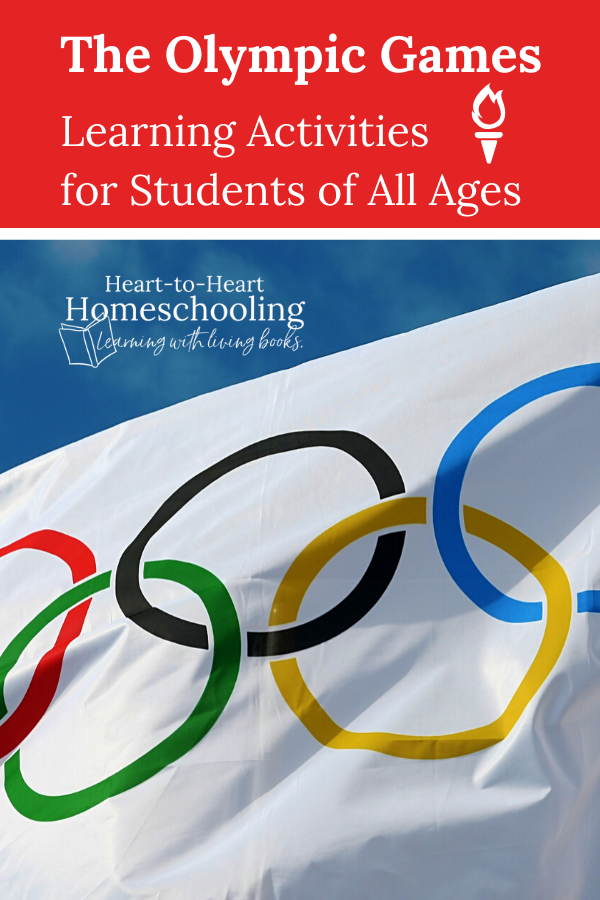
1. Research questions your family has about the Olympics.
This is the perfect time to have your students brush up on their research skills. When they study the history of the Olympics, they also learn about geography, government, and politics. They encounter stories of triumph and failure. And perhaps they will be inspired.
Begin by brainstorming questions about the Olympics together. Write the questions your students have on a white board. or have them write the questions in a notebook. Then go to the library together and search for the answers. And of course, you will find a lot of information online, too. (But if possible I think it is great for kids to learn to research both ways.)
For example, they might want to know
- Where did the first Olympics take place?
- What country has won the most medals in the winter Olympics? In the summer Olympics?
- Who has won the most medals in a single Olympic games? And who is the all-time highest medal winner?
- Where will the next Olympics be held?
- How are the places that host them chosen?
- What is involved with becoming a host city?
- What happens to the venues that were built for the Olympics when they are over?
They can then write about what they learn, do a presentation, or simply tell the rest of the family what they have discovered. Or, you will find ideas and resources below for putting together a notebook of all they learn.
2. Explore Olympic websites together.
Follow along with up-to-date information on the Internet. You can learn about the events, keep up with medal counts, and find out more about the Olympians who are competing. Here are a few sites to get you started:
3. Study geography.
Map the world.
Locate some (or all if you are really ambitious) of the countries on an outline map. Color, and label them. I was amazed how much my children remembered when they mapped using outline maps instead of labeled ones.
Geography Matters has several options including a Continents Map Set. You can purchase them laminated or not where it says “select map format”. We used the paper ones because, when folded, they fit perfectly into a notebook pocket divider. They also offer large maps of the world too.
Dig Deeper
Remember though, geography is about more than mapping. Spend some time learning about the physical features of different countries, their culture, and the stories of the people.
- The Usborne Geography Encyclopedia with Complete World Atlas will be something you can reference over and over again.
- See Inside World Religions allows kids to lift flaps “to discover the many ways people pray, worship and celebrate the major world religions.” (Ages 7+)
- Encyclopedia of World Religions explores “the beliefs, history and customs of all the major world religions, as well as many less well-known faiths, past and present.” (Ages 10+)
- Lift-the-Flap Questions and Answers About Our World includes “a full map of the world, and answers many questions such as – Where do the Sun & Moon go? What makes the wind blow and volcanoes erupt? How many countries and languages are there? Why is the Earth round and the sky blue? Do all plants have flowers and all rivers flow to the sea? Which is the biggest ocean and the brightest star?” (Ages 4+)
Learn the Flags of the World
Learn to identify flags from around the world with these great, fact-filled books. Or complete the 300 piece jigsaw puzzle (includes a Flags Coloring book!).
4. Do the math.
- Learn about time zones. Figure out what time it is in different parts of the world including PyeongChang, South Korea, where the Olympics are being held. Compare times across the world. How does that affect the televising of games?
- Figure out distances between competing teams. Have your students convert miles to kilometers or vice-versa.
- Keep track of the medals won by your country or another you choose. Then, make a chart of the results.
- Make a line graph of temperatures (See #5)
- Check out these ideas for younger learners from Scholastic in Winter Olympic Math.
- Make an Olympic Ring Graph from Teach Beside Me.
5. Create a notebook.
Besides many of the learning activities listed in this post, students can collect articles, newspaper clippings—really anything interesting they find that connects to the Olympics—to put in their notebooks.
I’ve created some Student Notebook Pages for your children to use during the Olympics.
The free Games Notebooking Pages include:
- A place to record questions to research
- Pages to record the high and low temperatures and weather conditions where you live, and the weather where the Olympics are being held (See #8).
- A grid page to make a line graph comparing the temperatures they recorded.
- A chart a country’s medal count.
- A graphic to compare medal counts of the top three countries. (But it is adaptable to use however you choose.)
- 2 pages to record whatever they want. Encourage them to be creative!
The following pages have an elementary, intermediate, and high school version:
- A place to record information about a chosen country with areas to write and draw.
- 2 designs of lined paper.
- Pages to write facts and draw an illustration for an Olympic sport.
- A “Fun Facts” page.
6. Get artsy.
Learn about the world through art.
The name for one of my favorite resources says it all: Geography Through Art: International Art Projects for Kids. But don’t assume “for kids” means it is only appropriate for elementary student. These are real art projects and will be valuable for whatever age your students are. And it includes so much more that art projects! It’s a resource you can use again and again.
Make an Olympic torch.
All you need are some paper towel rolls and red, yellow, and orange tissue paper, and anything your children might want to use to decorate their torch with.
Begin by letting your students decorate the paper towel roll. They can cover it in construction paper, tin foil, paint it, decorate with stickers—whatever they want. Then make flames using the tissue paper and stuff into the top of their “torch”.
Our co-oop kids then used their torches in a relay when they held a mini Olympics. Which lead us to #7.
7. Hold a mini Olympics with friends.
Let your kids create the games, write the rules, and figure out how the winners will be decided. Here are a few ideas for both summer and winter sports to get them started:
- Go to the pool and race one another. You can even make up your own events like “doggie paddle” across the width of the pool. Or see who can have the most creative jump off the diving board.
- Go to a local track and have relay races. Use something funny like a stuffed animal for the baton.
- Make sleds out of cardboard or use a towel. One person sits on the “sled” while another pulls them across the floor. Race one another.
- Pretend to be ice skaters and perform a routine in the middle of the room.
- Use brooms and a ball to play hockey.
Kids can even make medals and have a ceremony. Just let them get creative, move around, and have fun.
8. Learn about a science topic.
Find out about summer or winter weather (according to which olympics you are watching!).
Do a little research. Start with brainstorming some questions such as:
Summer Olympics
- What is the average temperature of the area that the Olympics are taking place in? Average rainfall? How does that compare with where I live?
- What types of severe weather does this area deal with in the summer, if any?
- What precautions do athletes need to take during extremely hot weather?
Winter Olympics
- What is the difference between rain, freezing rain, sleet, and snow? You can goole images of the differences and have your student make their own.
- How do we know a storm is a blizzard and not just a snow storm?
- What is a Nor’easter?
- What are the average temperatures for where they Olympics will be held during the winter?
Here are some great websites for kids to learn about weather:
And for older student I recommend JetStream—An Online School for Weather from the National Weather Service. It is much more detailed.
National Weather Service’s JetStream—An Online School for Weather
Explore the science behind various sports. Here are some websites to help:
The Physics of Ice Skating from The Learning Hypothesis.
9. Cook some meals from around the world.
Geography Matters also publishes a great cookbook by Jamie Aramini, Eat Your Way Around the World. It uses easy to find ingredients and simple instructions while still staying true to the flavors of the world. This book is filled with not only recipes, but fun facts about each area, and ideas for food activities your kids will enjoy. It is a perfect companion to your geography studies. And making dinner will do double duty as a geography and cooking lesson!
Or check out the Usborne Children’s World Cookbook. It contains “more than forty simple recipes from around the world, with information about traditional dishes of different countries and their ingredients. Includes URLs and descriptions of recommended Web sites that offer further information.”
10. Read aloud.
Chooses a read aloud set somewhere else in the world than where you live. Here were some of our favorites over the years.
To share with you younger kids, check out The Lion Storyteller Bedtime Book filled with bedtime stories from around the world.
Or, since the Olympics began in Greece, perhaps your children would enjoy a few Greek myths.
Or read about Eric Liddell, the Olympian who inspired the movie Chariots of Fire.
Olympic Learning
Homeschooling gives us a lot of freedom. Let’s take advantage of special opportunities and mix things up a bit. Enjoy these Olympic ideas with your children, and be assured—they will be learning!
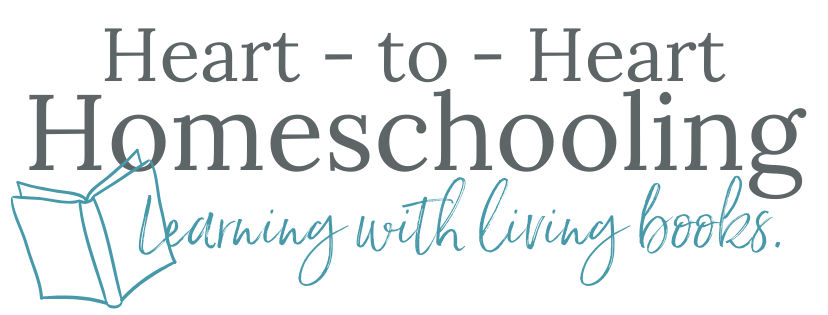
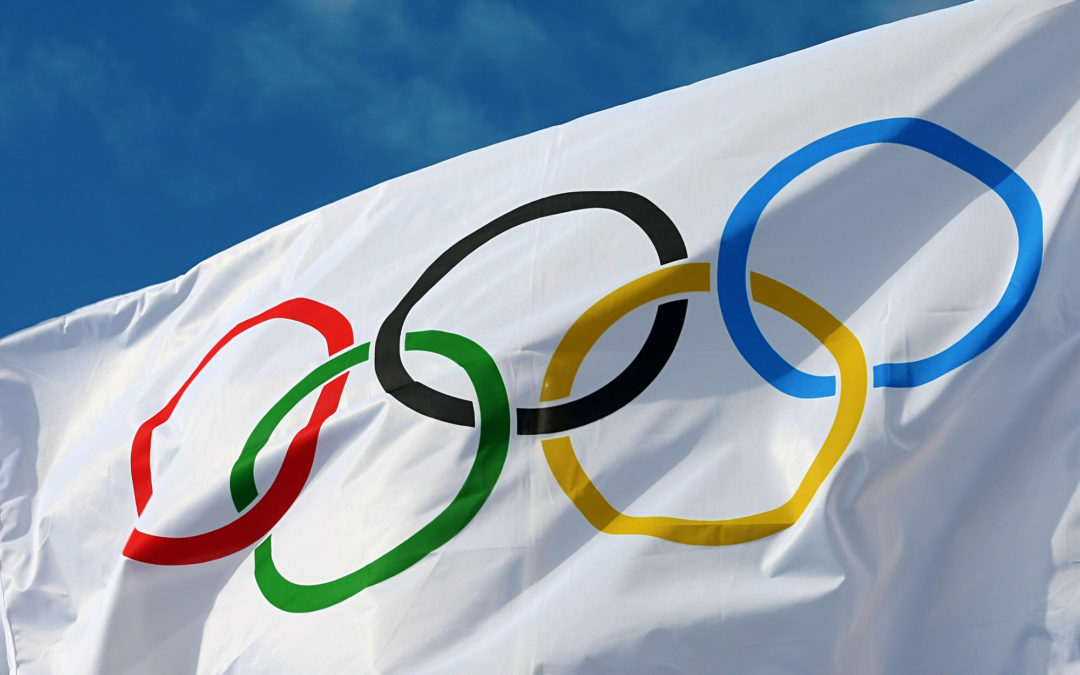
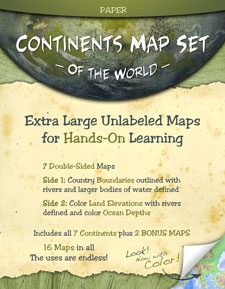
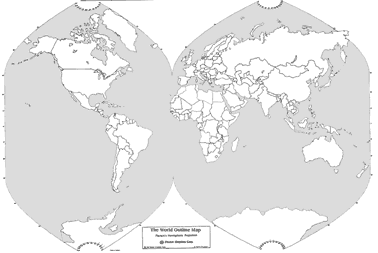
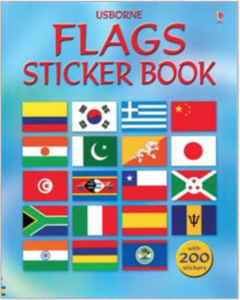


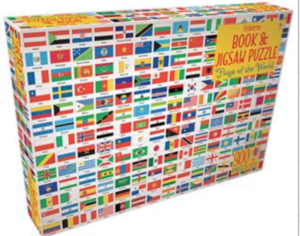

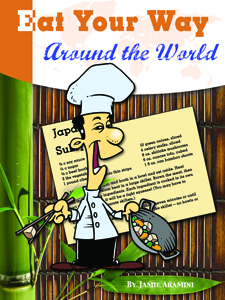
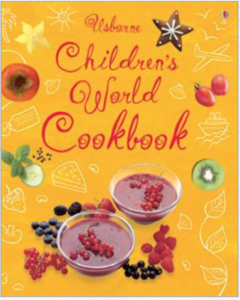
How much fun!! I am a homeschooler and I love this idea.
I’m so glad! I hope you enjoy learning together 🙂
I hadn’t thought of teaching about the Olympics but with all the resources you have given us, I think I can and that it would be something my son would enjoy. So I would like to thank you for creating this for us.
You are so welcome. It was actually fun! I hope he enjoys it!
This is PERFECT! I have 3 boys and we are gearing up for the Olympics! Thank you!
Yay! I hope they love it 🙂 And let me know how it goes!
Great ideas! Thank you for sharing.
I always love watching the summer Olympics but not a huge fan of the winter since the change in figure skating scoring (and now no NHLers). This should help bring exciting info to my little ones.
I have very specific sports I like in each. For the Winter ones it is ice skating (though I don’t like the scoring either!) and skiing. Summer, we love watching swimming and diving 🙂
What a perfect time to study the Olympics!
So much fun for sure!